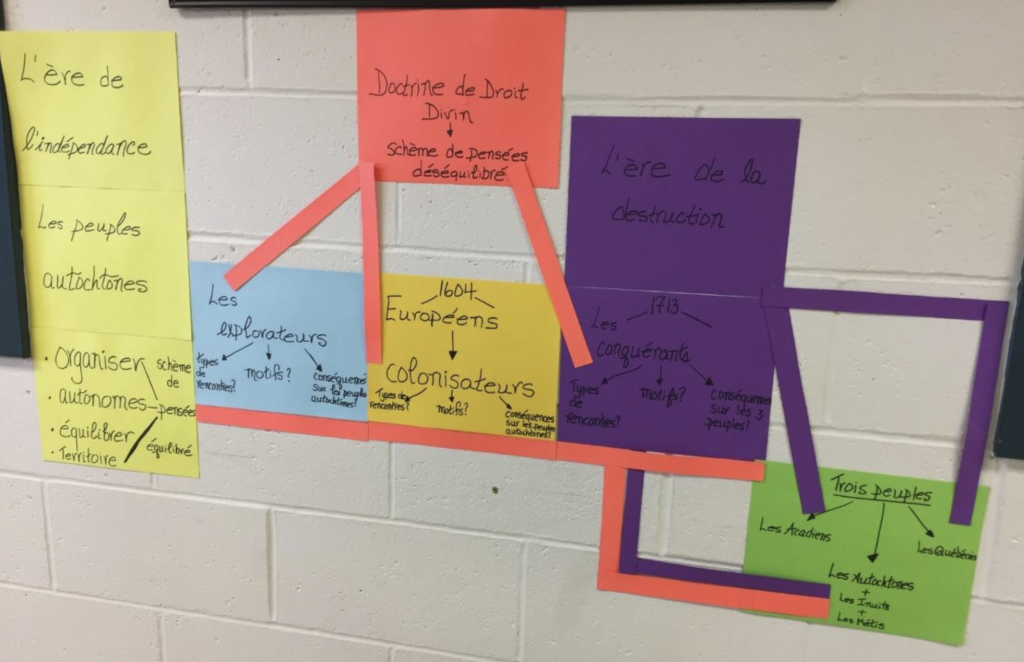Jacqueline Robichaud,
History teacher
Jacqueline Robichaud teaches Canadian History at Fredericton’s École Ste-Anne, which is part of the District scolaire francophone sud school board in New Brunswick and the only French-language high school in the provincial capital region. The school delivers curricula from grades 6 to 12 to a student base whose first language is not always French. From Ms. Robichaud’s perspective, one of the greatest challenges of this English-dominant environment is that she has to address her students’ language challenges by creating vocabulary activities such as word walls and diagrams to help them overcome these difficulties. Another complexity of teaching in a minority setting is sourcing French-language resources for history courses, including the study of primary sources. For this reason, Ms. Robichaud makes an extra effort to ensure that history courses do not become a source of anglicization.

École Ste-Anne
Fredericton, New Brunswick

Teaching & Learning
Jacqueline Robichaud enjoys inquiries where students answer a question using concepts of historical thinking. For example, when studying the arrival of the first Europeans, after watching Renée Blanchar’s film 1604 and taking a virtual tour of the Saint Croix Island International Historic Site, students question whether the island was a good choice for Pierre Duga de Mons’s crew in 1604. Jacqueline believes that working through the process of inquiry using the concept of ethical judgment leads students to use their cross-curricular skills and allows for interdisciplinarity and transdisciplinarity with their French courses, which Ms. Robichaud loves!
So, throughout the year, her students create a giant timeline to “work on historical relevance, continuity and change, causes and consequences, and ethical judgment.” The students must then “reach a consensus within their group by positioning their events as a gain or a loss and justify their choice to the class.” The students enjoy this activity, discussing it passionately: “What should we put on the timeline? Is it a loss? A gain? And for whom?” It is so nice to see, and it often sparks great discussions in French, which is wonderful since oral expression is an important part of teaching in a minority setting.

Indigenous Knowledge
Ms. Robichaud supports teaching the history of minorities, “stories that are never studied! I’ll teach the curriculum primarily through those stories, focusing on minorities in Canadian history.” In particular, “ indigenousness ” remains central to her teaching. As she puts it, “I have the greatest respect for these peoples, and I try to give them as much attention as possible in my teaching.”
With the school located near Indigenous communities on unceded territory, Ms. Robichaud is creative in using this situation to teach about relationships between peoples and treaties. She believes that her Indigenous students enrich her classes immeasurably, becoming “the link between me and the community in which they live.” She encourages them to spend time with their elders to learn more about their history, and to share it with the class.
It is also important to Ms. Robichaud that her students know where the Indigenous communities are located: “As part of an historical inquiry, we have an interactive map in class and every student has to know where each Indigenous people, each Indigenous territory is located before and after the arrival of Europeans.” This lesson is just one of many examples of how Ms. Robichaud gets young people thinking about the historical experiences of minorities in Canadian society.

Curriculum & Resources
Jacqueline likes to incorporate current events into her lessons to show students how useful history is, how it can be found everywhere and often close to home. In 2016, construction began on a convention center in Fredericton, and when the first shovels of earth were turned, barrels stacked with Loyalist-era crockery were found, among other things. This local news was of immediate interest to her. Because she could not take her students to the site, she brought the site into the classroom using photos and videos, and another inquiry activity using concepts of historical thinking was born in Ms. Robichaud’s class, enriching the timeline and interactive map at the same time. This time, students had to answer the question of whether these objects should be preserved. This inquiry gives students the opportunity to learn more about the Loyalists, understand the impact of their arrival on the minorities in the colonies at that time and in the province today, but also – and most importantly for Jacqueline – to demonstrate to students the importance and usefulness of history in everyday life.
Ms. Robichaud’s passion for teaching history is palpable. She explains how much she loves “seeing her students come to history class smiling and happy: Miss, what are we doing? What are we going to talk about today? And that’s the greatest gift I can receive.”
Co-created by Jacqueline Robichaud and Melissa Daoust
